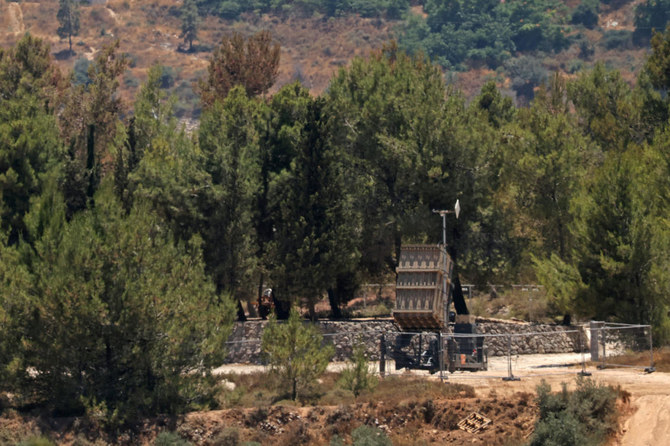BEIRUT: Israeli warplanes carried out mock raids over southern Lebanon on Friday, after Israel’s Iron Dome defense system failed to intercept and lost track of a drone coming from its neighbor, according to the Israel Defense Force, which later said that “the drone returned to Lebanon.”
The planes flew low over the Lebanese capital Beirut, with a Reuters witness reporting two jets being spotted.
“It is clear from the preliminary investigation that earlier today, a small drone was spotted inside Lebanon, flying toward Israeli territory,” IDF spokesman Avichay Adraee tweeted.
“Helicopters and warplanes were summoned, in addition to launching an interceptor missile from the Iron Dome without being able to intercept it,” he added. “Investigations revealed that it was a small Hezbollah recon drone.”
Friday’s infiltration came a day after the IDF downed a drone that it said was launched into Israeli airspace by Hezbollah.
UN Interim Force in Lebanon spokesperson Andrea Tenenti said: “The Israeli army informed UNIFIL ... that it had downed a drone south of the Blue Line. We informed the Lebanese Armed Forces and we are following up on the incident with the concerned parties.”
This incident constitutes a dangerous development that could contribute to an escalation in Hezbollah-Israel confrontations, especially since Hezbollah Secretary-General Hassan Nasrallah boasted on Wednesday about “the resistance having the capability to convert its missiles into precision missiles,” adding: “In Lebanon, for a long time, we have started to manufacture drones.”
Retired Lebanese Armed Forces Brig. Gen. Nizar Abdel-Kader told Arab News: “This escalation under the current circumstances can only be explained as attempts by Nasrallah to attribute more weakness to the (Lebanese) state, and it can be linked to his previous speech, in which he attacked the Lebanese army.”
He added: “Any escalation on the southern Lebanese border harms Lebanon, the implementation of Resolution 1701 and the reputation of the Lebanese army and its role in establishing security in the area south of the Litani River.”
Abdel-Kader noted: “Nasrallah talking about manufacturing drones and inviting buyers to place their orders harms Lebanon on all levels. Everyone is talking about the parliamentary elections, waiting for them and relying on them. Does this aim to create a security issue on the borders that leads to a dangerous escalation in preparation to postpone the elections?”
Nasrallah’s speech about manufacturing drones was met with official Lebanese silence, while anti-Hezbollah voices accused him of “overstepping Lebanese state institutions and crossing every red line there is.”
The Southerners for Freedom group criticized “the political foolishness that controls those leading the political system.”
The group addressed Nasrallah, saying: “Do your foolish and smart missiles feed a hungry Lebanese in Baalbek-Hermel, Bint Jbeil, Tyre, Hasbaya or Marjayoun? Do your drones provide diesel or firewood for a family in need of warmth in this freezing cold? Your missiles and drones will not benefit anyone, but will only increase destruction and chaos. Had you set up a factory or a development project in Baalbek-Hermel, Brital, Bint Jbeil, Aita al-Shaab and other towns, you would have created job opportunities for Lebanese youth instead of forcing them to emigrate to all corners of the earth to escape your projects and adventures.”
This development coincides with an internal Lebanese debate about the demarcation of the southern maritime border after President Michel Aoun announced last week that “Line 23 is Lebanon’s negotiating ceiling in indirect negotiations with the Israeli side under US mediation.”
This was also stressed by Foreign Minister Abdullah Bou Habib who said: “I am convinced that Line 23 is what serves Lebanon’s best interest.”
The Lebanese negotiating delegation had put Line 29 as a basis for negotiation, which would give Lebanon an additional area estimated at 2,290 square km in the disputed area and 1,430 square km from Line 23.
However, Line 23 gives Lebanon, according to delegation head Brig. Gen. Bassam Yassin, 860 square km only.
Yassin had recently criticized “making free concessions in the negotiations and achieving what Israel wants, while we gain nothing.”
Amos Hochstein, the US envoy for energy affairs, who is mediating the indirect negotiations, had been visiting Lebanon and Israel in an attempt to find a middle ground to resume negotiations and has confirmed progress.
















